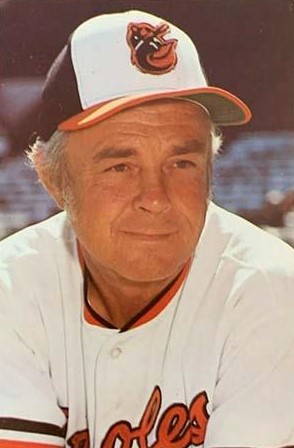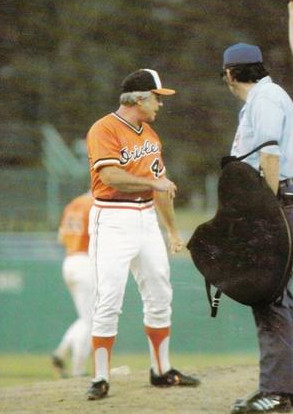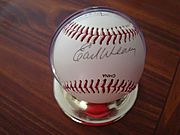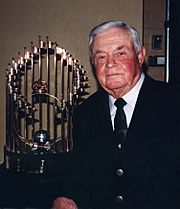Earl Weaver facts for kids
Quick facts for kids Earl Weaver |
|||
|---|---|---|---|

Weaver in 1976
|
|||
| Manager | |||
| Born: August 14, 1930 St. Louis, Missouri, U.S. |
|||
| Died: January 19, 2013 (aged 82) Aboard Celebrity Silhouette, Caribbean Sea |
|||
|
|||
| debut | |||
| July 7, 1968, for the Baltimore Orioles | |||
| Last appearance | |||
| October 5, 1986, for the Baltimore Orioles | |||
| MLB statistics | |||
| Games managed | 2,540 | ||
| Managerial record | 1,480–1,060 | ||
| Winning % | .583 | ||
| Teams | |||
|
|||
| Career highlights and awards | |||
|
|||
| Induction | 1996 | ||
| Vote | Veterans' Committee | ||
Earl Sidney Weaver (born August 14, 1930 – died January 19, 2013) was an American professional baseball manager. He also wrote books and worked as a television broadcaster. Weaver played in minor league baseball but never made it to Major League Baseball (MLB) as a player.
He became a minor league manager first. Later, he managed in MLB for 17 years with the Baltimore Orioles (1968–1982; 1985–86). Weaver's managing style was famous for his quote: "pitching, defense, and the three-run homer." He didn't like "small ball" tactics like stolen bases or sacrifice bunts. He was added to the Baseball Hall of Fame in 1996.
Contents
Earl Weaver's Playing Days
Earl Weaver grew up in St. Louis, Missouri. His father cleaned uniforms for baseball teams. In 1948, at age 17, the St. Louis Cardinals signed Weaver to play as a second baseman.
He was a good fielder but not a strong hitter. He played for teams like the Houston Buffaloes in the minor leagues. However, he never reached the major leagues as a player. Later, he joined the Orioles organization, where he started his managing career.
One famous pitcher, Jim Palmer, who played for Weaver, once joked: "The only thing that Earl knows about a curve ball is he couldn't hit it."
Earl Weaver's Managing Career
Weaver began his minor league managing career in 1956. He joined the Orioles organization in 1957. He managed several of their minor league teams, moving up through the ranks.
By 1966, he was managing the AAA Rochester Red Wings. As a minor league manager, he won 841 games and three championships. In 1967, he became the Orioles' first-base coach. Then, in July 1968, he became the manager of the Baltimore Orioles.
Leading the Baltimore Orioles
As the Orioles' manager, Weaver led them to win the American League pennant four times: in 1969, 1970, 1971, and 1979. Each of these years, the team won over 100 games. Weaver was the first manager since the 1940s to win 100 games in three years in a row.
In 1969, the Orioles lost the World Series to the New York Mets, known as the "Miracle Mets." In 1970, the Orioles won the World Series! They beat the Cincinnati Reds, also known as the "Big Red Machine." In 1971, the Orioles lost the World Series in seven games to the Pittsburgh Pirates.
Weaver loved it when his team scored with three-run home runs. Pitcher Jim Palmer said this was "a great plan if you have Boog Powells and Frank Robinsons and Brooks Robinsons." In 1974, the Orioles weren't hitting as many home runs. Weaver still wanted to use his strategy. The players held a secret meeting to change their approach. They decided to "squeeze every hit and every base and every run you can out of every play." This new plan helped them win their division.
Weaver earned his 1,000th MLB win as a manager in 1979. That year, the Orioles reached the World Series again. They lost in seven games to the Pittsburgh Pirates.
Retirement and Return
Weaver announced he would retire after the 1982 season. The Orioles had a tough first half of that year. But they started to climb in the standings. They ended up tied for first place in the last game of the season. They lost that final game, missing the division title. After the game, fans cheered for Weaver. He was very emotional, waving to the crowd.
The year after Weaver retired, the Orioles won the World Series. Jim Palmer said, "We won with a team Earl put together." The team's owner convinced Weaver to return in 1985. He retired for good after the 1986 season. This was his only full losing season as a major league manager. Weaver's total record as a manager was 1,480 wins and 1,060 losses.
In 1989, Weaver managed a team called the Gold Coast Suns. He was ejected from his first game with them! He often complained about the umpires in that league.
Weaver's Disciplinary Actions
Earl Weaver was famous for arguing with umpires. He was ejected from games at least 91 times during the regular season. He was even thrown out of both games in a doubleheader three times! Sometimes, he was ejected before a game even started.
Weaver was known for his humor during these arguments. Once, he told an umpire he was going to check the rulebook. The umpire offered his book, and Weaver replied, "That's no good—I can't read Braille." He also joked that an umpire could wear his gear on a TV show like What's My Line? and no one would guess his job.
He often kicked dirt on umpires and turned his cap backward to get close to them. His arguments with umpire Ron Luciano were legendary. Sometimes, after being ejected, Weaver would call the dugout to tell his coaches what to do next.
Weaver's Baseball Philosophy
Weaver's most famous baseball idea was "pitching, defense, and the three-run homer." He wrote books about his managing style. He didn't like "small ball" tactics like stolen bases or sacrifice bunts. He preferred waiting for a home run. He believed, "If you play for one run, that's all you'll get." He also said, "On offense, your most precious possessions are your 27 outs."
Weaver never used a sign for the hit and run play. He thought it made both the runner and the hitter too risky. He also believed in finishing as high as possible in the standings, even if they couldn't win the championship. He wanted his players to look professional, always wearing a suit or jacket and tie for road trips.
Jim Palmer said Weaver was "fiercely loyal to his players." However, Palmer also noted that Weaver didn't get to know his players very well personally.
Using Statistics
Weaver used statistics a lot to help his team. He had notebooks full of numbers about how his batters performed against different pitchers. He would use these stats to create his lineups. For example, if a weak hitter like Mark Belanger had a great record against a specific pitcher, Weaver would put him higher in the batting order.
In 1984, Weaver was recognized for being one of the first major league managers to use computer stats to help him make decisions.
Using the Bench
Weaver often used different players for the same position, which is called a platoon. For example, he used Gary Roenicke and John Lowenstein in left field. He also found a clever way to use the designated hitter rule. He would list a starting pitcher as the DH, then replace them before they batted. This gave him another chance to make a good matchup if the other team's pitcher left the game early.
Knowledge of Pitching
Many pitchers joked that Weaver didn't know much about pitching. Jim Palmer said, "The first thing I learned was that he didn't know a thing about pitching." Dave McNally agreed, saying, "The only thing Earl Weaver knows about pitching is that he can't hit it."
Weaver really liked slider pitches. Pitcher Mike Flanagan realized that Weaver got less angry if hits came off sliders. So, Flanagan would tell Weaver every hit was off a slider! Even though he might have driven them crazy, Weaver was good at finding and sticking with good pitchers.
Managerial Record
| Team | Year | Regular season | Postseason | |||||||
|---|---|---|---|---|---|---|---|---|---|---|
| Games | Won | Lost | Win % | Finish | Won | Lost | Win % | Result | ||
| BAL | 1968 | 82 | 48 | 34 | .585 | 2nd in AL | – | – | – | – |
| BAL | 1969 | 162 | 109 | 53 | .673 | 1st in AL East | 4 | 4 | .500 | Lost World Series (NYM) |
| BAL | 1970 | 162 | 108 | 54 | .667 | 1st in AL East | 7 | 1 | .875 | Won World Series (CIN) |
| BAL | 1971 | 158 | 101 | 57 | .639 | 1st in AL East | 6 | 4 | .600 | Lost World Series (PIT) |
| BAL | 1972 | 154 | 80 | 74 | .519 | 3rd in AL East | – | – | – | – |
| BAL | 1973 | 162 | 97 | 65 | .599 | 1st in AL East | 2 | 3 | .400 | Lost ALCS (OAK) |
| BAL | 1974 | 162 | 91 | 71 | .562 | 1st in AL East | 1 | 3 | .250 | Lost ALCS (OAK) |
| BAL | 1975 | 159 | 90 | 69 | .566 | 2nd in AL East | – | – | – | – |
| BAL | 1976 | 162 | 88 | 74 | .543 | 2nd in AL East | – | – | – | – |
| BAL | 1977 | 161 | 97 | 64 | .602 | 2nd in AL East | – | – | – | – |
| BAL | 1978 | 161 | 90 | 71 | .559 | 4th in AL East | – | – | – | – |
| BAL | 1979 | 159 | 102 | 57 | .642 | 1st in AL East | 6 | 5 | .545 | Lost World Series (PIT) |
| BAL | 1980 | 162 | 100 | 62 | .617 | 2nd in AL East | – | – | – | – |
| BAL | 1981 | 54 | 31 | 23 | .574 | 2nd in AL East | – | – | – | – |
| 51 | 28 | 23 | .549 | 4th in AL East | ||||||
| BAL | 1982 | 162 | 94 | 68 | .580 | 2nd in AL East | – | – | – | – |
| BAL | 1985 | 105 | 53 | 52 | .505 | 4th in AL East | – | – | – | – |
| BAL | 1986 | 162 | 73 | 89 | .451 | 7th in AL East | – | – | – | – |
| Total | 2540 | 1480 | 1060 | .583 | 26 | 20 | .565 | |||
Broadcasting Career
 |
|
| Earl Weaver's number 4 was retired by the Baltimore Orioles in 1982. |
Between his times as manager, Weaver worked as a color commentator for ABC television. He helped call the 1983 World Series, which the Orioles won. He also called the 1984 National League Championship Series.
Manager's Corner
While managing the Orioles, Weaver had a radio show called Manager's Corner. On the show, he shared his thoughts on baseball and answered fan questions. He once recorded a funny, prank version of the show with silly answers. This tape became famous in Baltimore sports.
Earl Weaver in Media
Weaver wrote three books about baseball strategy and his experiences. These books include Winning! (1972) and Weaver on Strategy (1984).
In 1987, Weaver helped create the AI for a computer game called Earl Weaver Baseball. This game was an early version of the popular EA Sports games.
Death of Earl Weaver
Earl Weaver passed away on January 19, 2013, at about 2 a.m. He was on a baseball cruise in the Caribbean Sea and had a heart attack. He was 82 years old. His wife, Marianna, was with him. By chance, another Baseball Hall of Fame member, Stan Musial, also died later that same day.
After Weaver's death, the commissioner of Major League Baseball, Bud Selig, shared a statement. He said Weaver was a "brilliant baseball man" and a "true tactician." He also called Weaver "one of the game's most colorful characters."
The Orioles' owner, Peter Angelos, said Weaver was "the greatest manager in the history of the Orioles organization." He added that Weaver's passion for the Orioles was clear both on and off the field.
Weaver's body was cremated after his death.
See also
- List of Major League Baseball managers by wins
 | Jackie Robinson |
 | Jack Johnson |
 | Althea Gibson |
 | Arthur Ashe |
 | Muhammad Ali |




